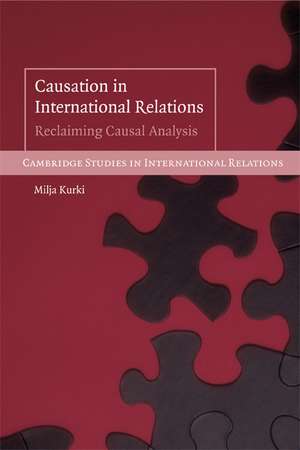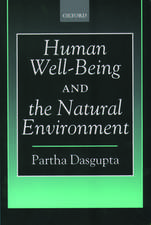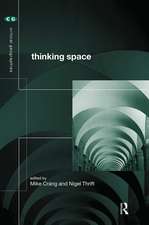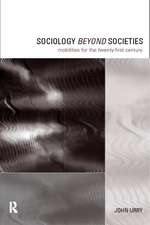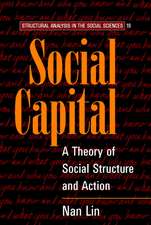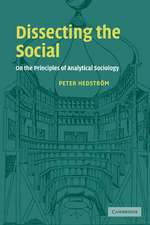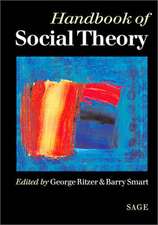Causation in International Relations: Reclaiming Causal Analysis: Cambridge Studies in International Relations, cartea 108
Autor Milja Kurkien Limba Engleză Paperback – 2 apr 2008
| Toate formatele și edițiile | Preț | Express |
|---|---|---|
| Paperback (1) | 325.16 lei 6-8 săpt. | |
| Cambridge University Press – 2 apr 2008 | 325.16 lei 6-8 săpt. | |
| Hardback (1) | 758.68 lei 6-8 săpt. | |
| Cambridge University Press – 2 apr 2008 | 758.68 lei 6-8 săpt. |
Din seria Cambridge Studies in International Relations
-
 Preț: 200.78 lei
Preț: 200.78 lei -
 Preț: 190.01 lei
Preț: 190.01 lei -
 Preț: 198.89 lei
Preț: 198.89 lei -
 Preț: 210.69 lei
Preț: 210.69 lei -
 Preț: 200.85 lei
Preț: 200.85 lei -
 Preț: 232.37 lei
Preț: 232.37 lei -
 Preț: 237.58 lei
Preț: 237.58 lei - 8%
 Preț: 401.23 lei
Preț: 401.23 lei -
 Preț: 229.56 lei
Preț: 229.56 lei -
 Preț: 265.70 lei
Preț: 265.70 lei -
 Preț: 200.08 lei
Preț: 200.08 lei -
 Preț: 207.81 lei
Preț: 207.81 lei -
 Preț: 158.77 lei
Preț: 158.77 lei -
 Preț: 162.49 lei
Preț: 162.49 lei -
 Preț: 231.47 lei
Preț: 231.47 lei - 11%
 Preț: 584.77 lei
Preț: 584.77 lei -
 Preț: 241.77 lei
Preț: 241.77 lei -
 Preț: 287.87 lei
Preț: 287.87 lei -
 Preț: 209.12 lei
Preț: 209.12 lei -
 Preț: 299.22 lei
Preț: 299.22 lei -
 Preț: 286.13 lei
Preț: 286.13 lei -
 Preț: 287.87 lei
Preț: 287.87 lei - 11%
 Preț: 641.67 lei
Preț: 641.67 lei - 11%
 Preț: 585.78 lei
Preț: 585.78 lei - 14%
 Preț: 843.23 lei
Preț: 843.23 lei -
 Preț: 303.80 lei
Preț: 303.80 lei -
 Preț: 284.78 lei
Preț: 284.78 lei -
 Preț: 279.76 lei
Preț: 279.76 lei -
 Preț: 285.75 lei
Preț: 285.75 lei -
 Preț: 324.24 lei
Preț: 324.24 lei -
 Preț: 290.16 lei
Preț: 290.16 lei -
 Preț: 291.69 lei
Preț: 291.69 lei -
 Preț: 392.52 lei
Preț: 392.52 lei -
 Preț: 315.99 lei
Preț: 315.99 lei
Preț: 325.16 lei
Nou
Puncte Express: 488
Preț estimativ în valută:
62.22€ • 65.09$ • 51.69£
62.22€ • 65.09$ • 51.69£
Carte tipărită la comandă
Livrare economică 02-16 aprilie
Preluare comenzi: 021 569.72.76
Specificații
ISBN-13: 9780521709507
ISBN-10: 0521709504
Pagini: 370
Ilustrații: 2 b/w illus.
Dimensiuni: 152 x 229 x 19 mm
Greutate: 0.59 kg
Ediția:New.
Editura: Cambridge University Press
Colecția Cambridge University Press
Seria Cambridge Studies in International Relations
Locul publicării:Cambridge, United Kingdom
ISBN-10: 0521709504
Pagini: 370
Ilustrații: 2 b/w illus.
Dimensiuni: 152 x 229 x 19 mm
Greutate: 0.59 kg
Ediția:New.
Editura: Cambridge University Press
Colecția Cambridge University Press
Seria Cambridge Studies in International Relations
Locul publicării:Cambridge, United Kingdom
Cuprins
Introduction: the problem of causation and the divided discipline of international relations; Part I. The Humean Philosophy of Causation and its Legacies: 1. The Humean philosophy of causation and its legacies in philosophy of science; 2. Controversy over causes in the social sciences; 3. Humeanism and rationalist causal analysis in international relations; 4. Reflectivist and constructivist approaches in international relations: more cases of Humeanism; Part II. Rethinking the Concept of Cause: 5. Attempts to move beyond Humeanism: strengths and weaknesses; 6. Rethinking causation: towards a deeper and broader concept of cause; Part III. Reconfiguring Causal Analysis of World Politics: 7. Expanding horizons in world political causal inquiry; 8. Reconceptualising causes, reframing the divided discipline.
Recenzii
'Cause is the central concept of any science, including human sciences. Yet, most IR scholars seem to assume that this is not the case, which explains in part the appalling state of the discipline. To paraphrase Kant, it is time to awaken IR scholars from their 'dogmatic slumber' by shifting the field of background discourse, as Kurki attempts to do here. Her brilliant book will no doubt make a huge contribution to the revival of cumulative research in world politics, peace and conflict studies and related fields.' Heikki Patomäki, University of Helsinki
Notă biografică
Descriere
Proposes a new approach to causal analysis in international relations by exploring the concept's roots and uses in the field.
